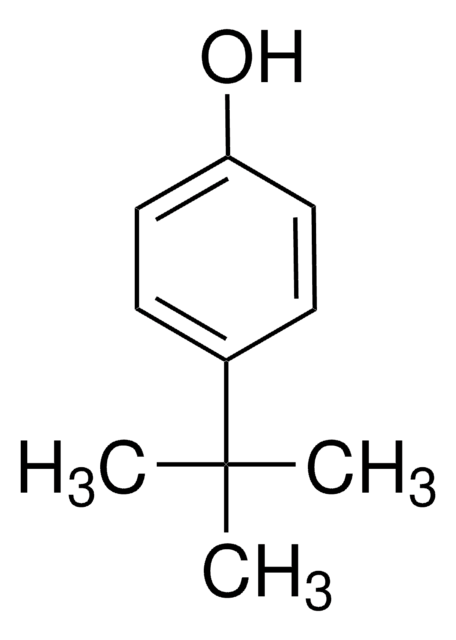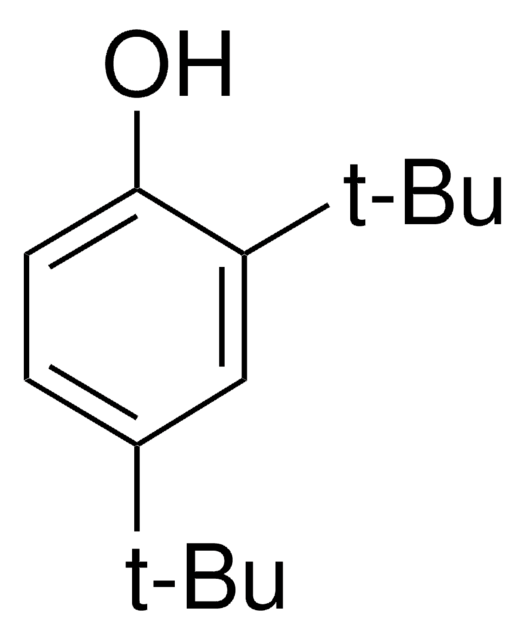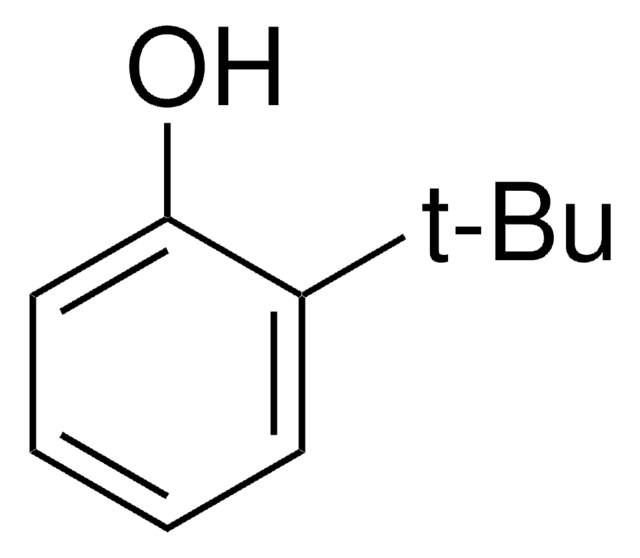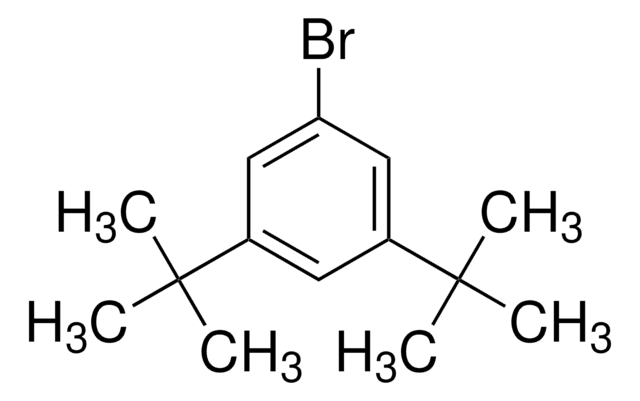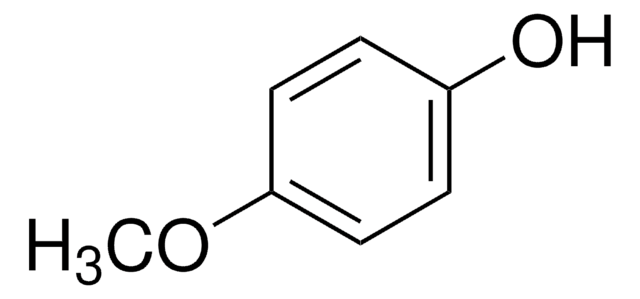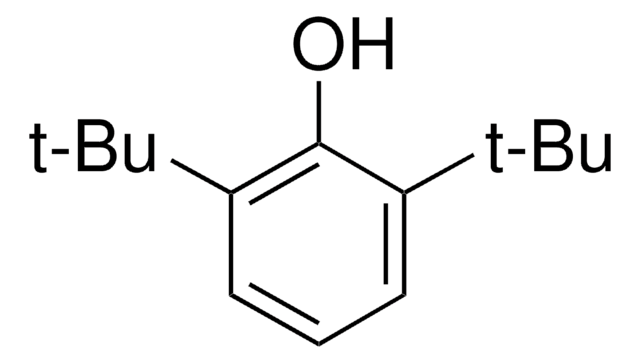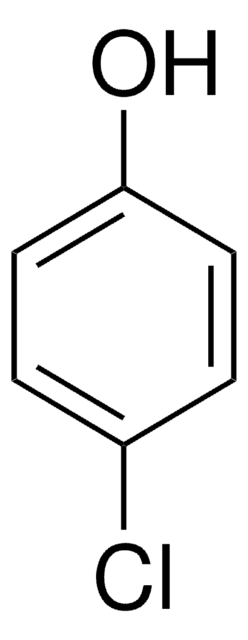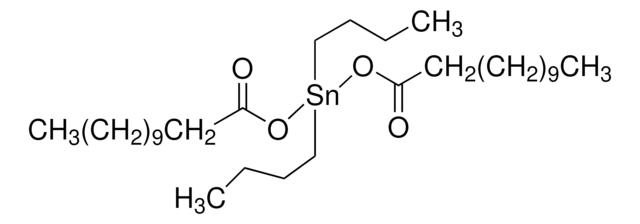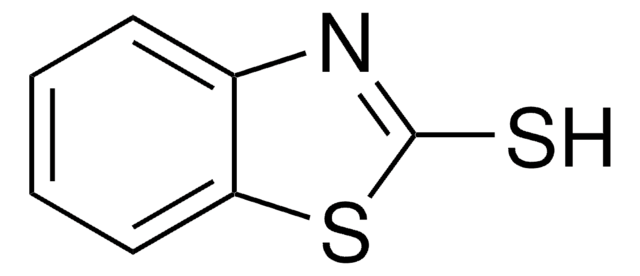124281
3-tert-Butylphenol
99%
Autenticatiper visualizzare i prezzi riservati alla tua organizzazione & contrattuali
About This Item
Formula condensata:
(CH3)3CC6H4OH
Numero CAS:
Peso molecolare:
150.22
Numero CE:
Numero MDL:
Codice UNSPSC:
12352100
ID PubChem:
NACRES:
NA.22
Prodotti consigliati
Livello qualitativo
Saggio
99%
P. eboll.
125-130 °C/20 mmHg (lit.)
Punto di fusione
44-46 °C (lit.)
Stringa SMILE
CC(C)(C)c1cccc(O)c1
InChI
1S/C10H14O/c1-10(2,3)8-5-4-6-9(11)7-8/h4-7,11H,1-3H3
CYEKUDPFXBLGHH-UHFFFAOYSA-N
Informazioni sul gene
mouse ... Esr1(13982)
Categorie correlate
Descrizione generale
3-tert-Butylphenol undergoes stereoselective hydrogenation over charcoal-supported rhodium catalyst in supercritical carbon dioxide solvent.
Applicazioni
3-tert-Butylphenol has been used to study the effect of alkyl group on the phenol ring on the estrogenic potency of alkylphenolic compounds in the yeast screen.
Altre note
Contains 4-tert-butylphenol
Avvertenze
Danger
Indicazioni di pericolo
Classi di pericolo
Eye Dam. 1 - Skin Corr. 1B
Codice della classe di stoccaggio
8A - Combustible corrosive hazardous materials
Classe di pericolosità dell'acqua (WGK)
WGK 3
Punto d’infiammabilità (°F)
228.2 °F - closed cup
Punto d’infiammabilità (°C)
109 °C - closed cup
Dispositivi di protezione individuale
Eyeshields, Faceshields, Gloves, type P3 (EN 143) respirator cartridges
Scegli una delle versioni più recenti:
Possiedi già questo prodotto?
I documenti relativi ai prodotti acquistati recentemente sono disponibili nell’Archivio dei documenti.
I clienti hanno visto anche
Stereoselective hydrogenation of tert-butylphenols over charcoal-supported rhodium catalyst in supercritical carbon dioxide solvent.
Hiyoshi N, et al.
J. Catal., 252(1), 57-68 (2007)
E J Routledge et al.
The Journal of biological chemistry, 272(6), 3280-3288 (1997-02-07)
The ability of certain man-made chemicals to mimic the effects of natural steroid hormones and their potential to disrupt the delicate balance of the endocrine system in animals are of increasing concern. The growing list of reported hormone-mimics includes the
Tadashi Toyama et al.
Biodegradation, 21(2), 157-165 (2009-08-26)
A novel bacterium capable of utilizing 2-sec-butylphenol as the sole carbon and energy source, Pseudomonas sp. strain MS-1, was isolated from freshwater sediment. Within 30 h, strain MS-1 completely degraded 1.5 mM 2-sec-butylphenol in basal salt medium, with concomitant cell
Cynthia D Selassie et al.
Journal of medicinal chemistry, 48(23), 7234-7242 (2005-11-11)
In this comprehensive study on the caspase-mediated apoptosis-inducing effect of 51 substituted phenols in a murine leukemia cell line (L1210), we determined the concentrations needed to induce caspase activity by 50% (I50) and utilized these data to develop the following
Alfonso Pérez-Garrido et al.
Bioorganic & medicinal chemistry, 17(2), 896-904 (2008-12-06)
This paper reports a QSAR study for predicting the complexation of a large and heterogeneous variety of substances (233 organic compounds) with beta-cyclodextrins (beta-CDs). Several different theoretical molecular descriptors, calculated solely from the molecular structure of the compounds under investigation
Il team dei nostri ricercatori vanta grande esperienza in tutte le aree della ricerca quali Life Science, scienza dei materiali, sintesi chimica, cromatografia, discipline analitiche, ecc..
Contatta l'Assistenza Tecnica.